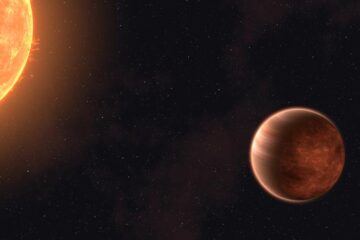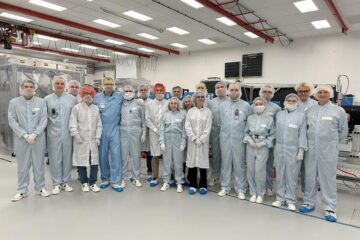Arctic Climate Change Uncovered

56 million years of Arctic history were recently uncovered during the course of the world’s largest Earth Science programme, which should enable scientists to understand climate change more effectively.
The University of Leicester Geology Department is playing a significant part in the Integrated Ocean Drilling Program (IODP), which began in 2003 and has a predicted budget of $160M per annum by 2007.
As part of this international programme, Europe is a lead partner under the umbrella organisation European Consortium for Ocean Research Drilling (ECORD). ECORD has contracted the British Geological Survey, University of Bremen and the European Petrophysics Consortium (with the University of Leicester as the lead agency) as the Science Operator for mission specific platforms.
This project involves the scientific exploration of the oceans and the sub-seafloor, to develop and extend our knowledge and understanding of global processes such as climate change and tectonic evolution.
The Leicester Geology Department, takes an active role in this project, both through providing advice and support to scientists worldwide, and through participation in drilling at sea.
In August 2004, the first ever deep drilling of the Arctic Ocean was undertaken by IODP, and as part of the expedition University of Leicester Geologist, Dr Brice Rea, sailed as the petrophysical staff scientist in a successful attempt to drill 2 degrees south of the north pole.
Using the Vidar Viking drill ship, a 428m section of sedimentary rocks was drilled, with 339m of core being recovered, providing an approximate 56 million-year record of events in the Arctic Ocean, which rest on an 80 million-year old ’basement’.
Preliminary results suggest that between 48 and 56 million years ago the Arctic was much warmer than today, and that about 55 million years ago there was a brief episode of global warming.
In a public lecture in October 2004, the Director of the British Geological Survey (BGS) acclaimed this major achievement as one of the most significant highlights of the past year in which both the BGS and University of Leicester played major roles.
Mike Lovell, Professor of Petrophysics and Head of the Geology Department at the University of Leicester, commented: “A new phase of ocean exploration has started through the Integrated Ocean Drilling Program. This hugely expanded programme will involve researchers across the globe using a variety of drillships to improve our understanding of the Earth and its evolution. Geologists at the University of Leicester will play an important and central part in many of these operations worldwide.”
Media Contact
Weitere Informationen:
http://www.le.ac.ukAlle Nachrichten aus der Kategorie: Geowissenschaften
Die Geowissenschaften befassen sich grundlegend mit der Erde und spielen eine tragende Rolle für die Energieversorgung wie die allg. Rohstoffversorgung.
Zu den Geowissenschaften gesellen sich Fächer wie Geologie, Geographie, Geoinformatik, Paläontologie, Mineralogie, Petrographie, Kristallographie, Geophysik, Geodäsie, Glaziologie, Kartographie, Photogrammetrie, Meteorologie und Seismologie, Frühwarnsysteme, Erdbebenforschung und Polarforschung.
Neueste Beiträge

Wolken bedecken die Nachtseite des heißen Exoplaneten WASP-43b
Ein Forschungsteam, darunter Forschende des MPIA, hat mit Hilfe des Weltraumteleskops James Webb eine Temperaturkarte des heißen Gasriesen-Exoplaneten WASP-43b erstellt. Der nahe gelegene Mutterstern beleuchtet ständig eine Hälfte des Planeten…

Neuer Regulator des Essverhaltens identifiziert
Möglicher Ansatz zur Behandlung von Übergewicht… Die rapide ansteigende Zahl von Personen mit Übergewicht oder Adipositas stellt weltweit ein gravierendes medizinisches Problem dar. Neben dem sich verändernden Lebensstil der Menschen…

Maschinelles Lernen optimiert Experimente mit dem Hochleistungslaser
Ein Team von internationalen Wissenschaftlerinnen und Wissenschaftlern des Lawrence Livermore National Laboratory (LLNL), des Fraunhofer-Instituts für Lasertechnik ILT und der Extreme Light Infrastructure (ELI) hat gemeinsam ein Experiment zur Optimierung…





















